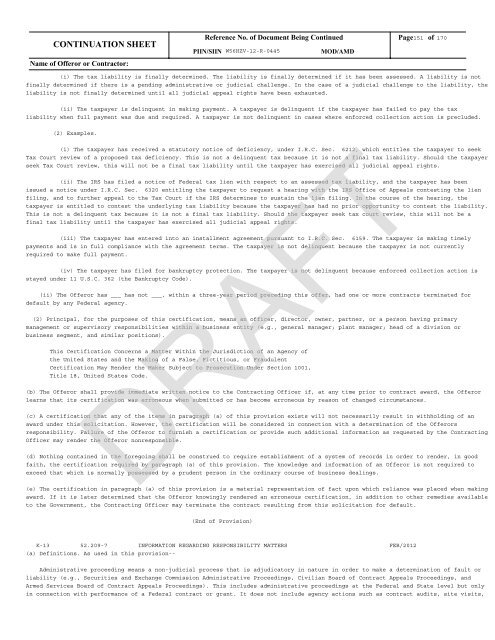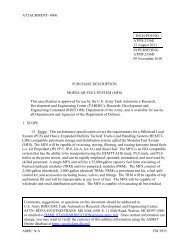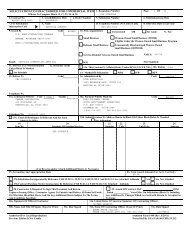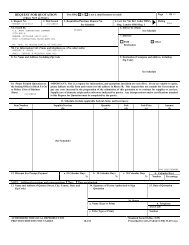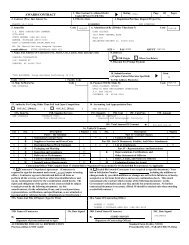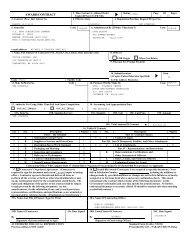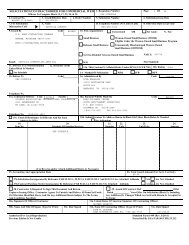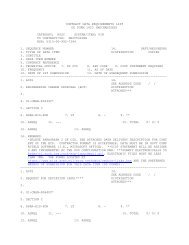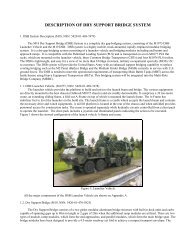draft beb rfp - TACOM Procurement Network - U.S. Army
draft beb rfp - TACOM Procurement Network - U.S. Army
draft beb rfp - TACOM Procurement Network - U.S. Army
You also want an ePaper? Increase the reach of your titles
YUMPU automatically turns print PDFs into web optimized ePapers that Google loves.
CONTINUATION SHEET<br />
Name of Offeror or Contractor:<br />
Reference No. of Document Being Continued Page 151 of 170<br />
PIIN/SIIN W56HZV-12-R-0445<br />
MOD/AMD<br />
(i) The tax liability is finally determined. The liability is finally determined if it has been assessed. A liability is not<br />
finally determined if there is a pending administrative or judicial challenge. In the case of a judicial challenge to the liability, the<br />
liability is not finally determined until all judicial appeal rights have been exhausted.<br />
(ii) The taxpayer is delinquent in making payment. A taxpayer is delinquent if the taxpayer has failed to pay the tax<br />
liability when full payment was due and required. A taxpayer is not delinquent in cases where enforced collection action is precluded.<br />
(2) Examples.<br />
(i) The taxpayer has received a statutory notice of deficiency, under I.R.C. Sec. 6212, which entitles the taxpayer to seek<br />
Tax Court review of a proposed tax deficiency. This is not a delinquent tax because it is not a final tax liability. Should the taxpayer<br />
seek Tax Court review, this will not be a final tax liability until the taxpayer has exercised all judicial appeal rights.<br />
(ii) The IRS has filed a notice of Federal tax lien with respect to an assessed tax liability, and the taxpayer has been<br />
issued a notice under I.R.C. Sec. 6320 entitling the taxpayer to request a hearing with the IRS Office of Appeals contesting the lien<br />
filing, and to further appeal to the Tax Court if the IRS determines to sustain the lien filing. In the course of the hearing, the<br />
taxpayer is entitled to contest the underlying tax liability because the taxpayer has had no prior opportunity to contest the liability.<br />
This is not a delinquent tax because it is not a final tax liability. Should the taxpayer seek tax court review, this will not be a<br />
final tax liability until the taxpayer has exercised all judicial appeal rights.<br />
(iii) The taxpayer has entered into an installment agreement pursuant to I.R.C. Sec. 6159. The taxpayer is making timely<br />
payments and is in full compliance with the agreement terms. The taxpayer is not delinquent because the taxpayer is not currently<br />
required to make full payment.<br />
(iv) The taxpayer has filed for bankruptcy protection. The taxpayer is not delinquent because enforced collection action is<br />
stayed under 11 U.S.C. 362 (the Bankruptcy Code).<br />
(ii) The Offeror has ___ has not ___, within a three-year period preceding this offer, had one or more contracts terminated for<br />
default by any Federal agency.<br />
(2) Principal, for the purposes of this certification, means an officer, director, owner, partner, or a person having primary<br />
management or supervisory responsibilities within a business entity (e.g., general manager; plant manager; head of a division or<br />
business segment, and similar positions).<br />
This Certification Concerns a Matter Within the Jurisdiction of an Agency of<br />
the United States and the Making of a False, Fictitious, or Fraudulent<br />
Certification May Render the Maker Subject to Prosecution Under Section 1001,<br />
Title 18, United States Code.<br />
(b) The Offeror shall provide immediate written notice to the Contracting Officer if, at any time prior to contract award, the Offeror<br />
learns that its certification was erroneous when submitted or has become erroneous by reason of changed circumstances.<br />
DRAFT<br />
(c) A certification that any of the items in paragraph (a) of this provision exists will not necessarily result in withholding of an<br />
award under this solicitation. However, the certification will be considered in connection with a determination of the Offerors<br />
responsibility. Failure of the Offeror to furnish a certification or provide such additional information as requested by the Contracting<br />
Officer may render the Offeror nonresponsible.<br />
(d) Nothing contained in the foregoing shall be construed to require establishment of a system of records in order to render, in good<br />
faith, the certification required by paragraph (a) of this provision. The knowledge and information of an Offeror is not required to<br />
exceed that which is normally possessed by a prudent person in the ordinary course of business dealings.<br />
(e) The certification in paragraph (a) of this provision is a material representation of fact upon which reliance was placed when making<br />
award. If it is later determined that the Offeror knowingly rendered an erroneous certification, in addition to other remedies available<br />
to the Government, the Contracting Officer may terminate the contract resulting from this solicitation for default.<br />
(End of Provision)<br />
K-13 52.209-7 INFORMATION REGARDING RESPONSIBILITY MATTERS FEB/2012<br />
(a) Definitions. As used in this provision--<br />
Administrative proceeding means a non-judicial process that is adjudicatory in nature in order to make a determination of fault or<br />
liability (e.g., Securities and Exchange Commission Administrative Proceedings, Civilian Board of Contract Appeals Proceedings, and<br />
Armed Services Board of Contract Appeals Proceedings). This includes administrative proceedings at the Federal and State level but only<br />
in connection with performance of a Federal contract or grant. It does not include agency actions such as contract audits, site visits,


